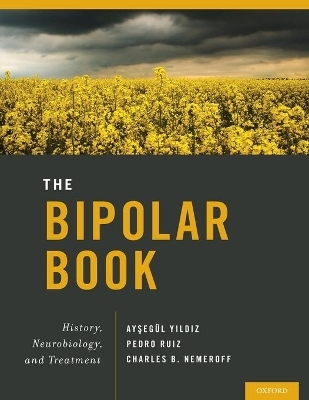
The Bipolar Book
Oxford University Press Inc (Verlag)
978-0-19-062001-1 (ISBN)
As a major mainstay of clinical focus and research today, bipolar disorder affects millions of individuals across the globe with its extreme and erratic shifts of mood, thinking and behavior. Edited by a team of experts in the field, The Bipolar Book: History, Neurobiology, and Treatment is a testament and guide to diagnosing and treating this exceedingly complex, highly prevalent disease.
Featuring 45 chapters from an expert team of contributors from around the world, The Bipolar Book delves deep into the origins of the disorder and how it informs clinical practice today by focusing on such topics as bipolar disorder occurring in special populations, stigmatization of the disease, the role genetics play, postmortem studies, psychotherapy, treatments and more.
Designed to be the definitive reference volume for clinicians, students and researchers, Aysegül Yildiz, Pedro Ruiz and Charles Nemeroff present The Bipolar Book as a "must have" for those caregivers who routinely deal with this devastating disease.
Aysegül Yildiz, MD Professor of Psychiatry Dokuz Eylül University Izmir, Turkey; Pedro Ruiz, MD Clinical Professor of Psychiatry and Behavioral Sciences University of Texas Medical School at Houston Houston, TX, USA; Charles B. Nemeroff, MD, PhD Leonard M. Miller Professor & Chairman Department of Psychiatry University of Miami - Miller School of Medicine Miami, FL, USA
Section I: Clinical Presentation
Chapter 1. From the Era of Aretaeus to the Millennium: History of Bipolar Disorder Over 2000 Years
Chapter 2. Update on Epidemiology, Risk Factors and Correlates of Bipolar Spectrum Disorder
Chapter 3. Clinical Presentation & DSM-based Diagnostic Assessment
Chapter 4. Differential Diagnosis & Bipolar Spectrum Disorders
Chapter 5. Diagnosing Bipolar Disorder in Children and Adolescents
Chapter 6. Effect of Public Awareness & Stigmatization on Accurate & Timely Diagnosis of Bipolar Disorder
Section II: Insights on Pathophysiology & Future Treatments
Part I: Molecular Biology
Chapter 7. Oxidative Damage & Its Treatment Impact
Chapter 8. The Role of Signal Transduction Systems in the Pathophysiology and Treatment of Bipolar Disorder
Chapter 9. Cellular Resilience and Neurodegeneration and Their Impact on the Treatment of Bipolar Disorder
Chapter 10. Immune Mechanisms and Inflammation & Their Treatment Impact
Chapter 11. Circadian Rhythms and Sleep & Its Treatment Impact
Chapter 12. HPA & HPT Axis & Their Treatment Impact
Chapter 13. Translating Bio-markers and Bio-molecular Treatments to Clinical Practice: Assessment of Hypothesis Driven Clinical Trial Data
Part II: Genetic
Chapter 14. Bipolar Family & Bipolar Offspring Studies: Any Clues for Prevention or Early Intervention
Chapter 15. The Emerging Genetics of Bipolar Disorder
Part III: Cognition
Chapter 16: Cognitive Impairments and Everyday Disability in Bipolar Illness
Part IV: Neuroimaging
Chapter 17. Structural & Functional Magnetic Resonance Imaging Findings & Their Treatment Impact
Chapter 18. Magnetic Resonance Spectroscopy Findings & Their Treatment Impact
Chapter 19. PET Scan Findings & Their Treatment Impact
Part V: Postmortem studies
Chapter 20. Postmortem Findings in Bipolar Disorder & Their Treatment Impact
Section III: Current Treatments
Part I: Pharmacological Treatments
Chapter 21. Treatment of Mania & Mixed States
Chapter 22. Pharmacological Treatment of Acute Bipolar Depression
Chapter 23. Maintenance Treatments in Bipolar Disorder
Chapter 24. Importance of Early Intervention in Bipolar Disorder
Chapter 25. Alternative and Complementary Treatments
Part II: Somatic Non-Pharmacological Treatments
Chapter 26. ECT and Bipolar Disorder
Chapter 27. Neuromodulative Treatments for Bipolar Disorder: Repetitive Transcranial Magnetic Stimulation, Vagus Nerve Stimulation and Deep Brain Stimulation
Part III: Adverse treatment effects
Chapter 28. Management of Metabolic and Endocrinological Effects
Chapter 29. Neurological, Cognitive and Neuroprotective Effects of Treatments in Bipolar Disorder
Chapter 30. Treatment Induced Mood Instability-TEAs and Cycle Acceleration
Part IV: Psychotherapy
Chapter 31. Cognitive Behavioral Therapy and Psychoeducation
Chapter 32. Family Focused Therapy, Interpersonal and Social Rhythm Therapy & Dialectical Behavioral Therapy
Part V: Comorbidity
Chapter 33. Management of Comorbid Axis-I Psychiatric Disorders
Chapter 34. Management of Cyclothymia and Comorbid Axis-II Psychiatric Disorders
Chapter 35. Management of Comorbid Substance or Alcohol Abuse
Chapter 36. Management of Comorbid Medical Problems
Part VI: Suicidality
Chapter 37. Clinical Management of Suicide Risk
Part VII: Pregnancy & Lactation
Chapter 38. Management of Bipolar Disorder During Pregnancy and Lactation
Part VIII: Children & Adolescents
Chapter 39. Management of Bipolar Disorder in Children and Adolescents
Part IX: Elderly
Chapter 40. Bipolar Disorder in the Elderly
Section IV: Future Research
Chapter 41. Placebo Response in Clinical Trials for Bipolar Disorder: Potential Causes, Potential Solutions
Chapter 42. Strategies for Improving Randomized Trial Evidence in Treatment of Bipolar Disorder
Chapter 43. Challenges in Designing Reliable and Feasible Treatment Trials for Bipolar Disorder
Chapter 44. Sequential Multiple Assignment Randomized Trials
Chapter 45. Traditional and Novel Research Synthesis Approaches to Support Evidence-based Treatment Decisions
| Erscheinungsdatum | 23.04.2016 |
|---|---|
| Verlagsort | New York |
| Sprache | englisch |
| Maße | 277 x 213 mm |
| Gewicht | 1601 g |
| Themenwelt | Geisteswissenschaften ► Psychologie ► Biopsychologie / Neurowissenschaften |
| Geisteswissenschaften ► Psychologie ► Klinische Psychologie | |
| Geisteswissenschaften ► Psychologie ► Verhaltenstherapie | |
| Medizin / Pharmazie ► Medizinische Fachgebiete ► Psychiatrie / Psychotherapie | |
| ISBN-10 | 0-19-062001-3 / 0190620013 |
| ISBN-13 | 978-0-19-062001-1 / 9780190620011 |
| Zustand | Neuware |
| Haben Sie eine Frage zum Produkt? |
aus dem Bereich


